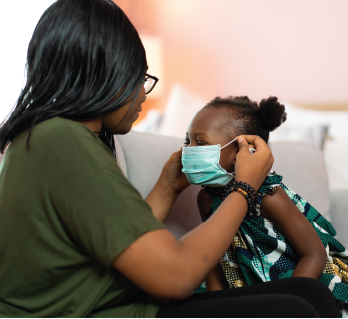
BigPixel Photo / shutterstock.com
It is nine months into the COVID-19 pandemic in the U.S. and the third wave is upon us, overwhelming hospital systems in many states across the country. But the alarms are being sounded for another looming pandemic as well. As early as spring 2020, significant increases were documented in the prevalence of depression and anxiety, substance use, trauma and stress-related disorders, and suicidal ideation.
Like so many other aspects of the COVID-19 pandemic, the psychological effects fall unequally across U.S. populations: Black, Latinx and other minorities are disproportionately affected. Essential workers, a term that quickly evolved to encompass anyone not privileged to work from the safety of their home, are disproportionately harmed. Healthcare workers, especially those who are caregivers, have the dual burden of witnessing the worst this virus can do and bearing the anxiety of potential exposure to themselves and their families. Individuals with rheumatic conditions face the compound stressors of increased risk of infection, physical isolation and managing chronic conditions in a setting riddled by limitations in care, medications and providers.
Although the physical risk of COVID-19 is much greater in older adults, young people appear to be particularly affected by the indirect emotional consequences of the pandemic. Between March and June 2020, the Centers for Disease Control and Prevention conducted a national survey of mental health symptoms in adults and found that more than 25% of young adults aged 18 to 24 years old had suicidal ideation, compared with 2% of adults aged 65 or older—the age group most likely to die from COVID-19.1
The rates of suicidal ideation in young adults are especially concerning given that suicide was already the second-leading cause of death among 10- to 24-year-olds prior to the pandemic.2 Suicide in young people has been a recognized public health crisis, with an alarming increase in the past several years, especially among Black girls. Even mild and moderate distress can take a toll on children and their emotional and physical health trajectory throughout their lives. Thus, addressing psychological distress in youth is of utmost concern and urgency, specifically at this unique point in history.
Guidance Available
In late October, the American Academy of Pediatrics (AAP) released interim guidance on addressing the emotional health of children, adolescents and families during the pandemic.3-5 In the guidance, the AAP emphasizes the pandemic has only made it more important for us to continue to integrate mental health into our standard of care in pediatrics.
The authors of the AAP guidance statement and other pediatric mental health experts raise concerns about specific high-risk groups that require extra attention: low-income youth, youth from marginalized minority groups affected by what has been termed the twin pandemics of COVID-19 and racism, and youth with chronic diseases and special healthcare needs.
For many pediatric and adult rheumatologists, current standard of practice does not involve a systematic approach to address mental health. This includes the low-hanging fruit of screening for depression and suicidality that has become standard of care in general medical settings. For rheumatology clinics, problem areas are a lack of resources and a lack of guidance. These are important, but not insurmountable, problems.
The pediatric rheumatology community, specifically, can look to the work that has been done in pediatric diabetes and cystic fibrosis. These communities have developed their own guidance statements regarding the integration of screening and addressing depression, anxiety and suicidality in their clinics. Similar guidance statements for pediatric rheumatology providers could help inform and standardize approaches to mental healthcare.
Over the past two years the Childhood Arthritis and Rheumatology Research Alliance Mental Health Workgroup has been working toward systematically developing similar guidance tailored to pediatric rheumatology clinics. A taskforce of mental health providers, patients and parents, patient advocates and pediatric rheumatologists set out to develop and then iteratively revise guidance on screening and addressing the most common mental health problems that face youth with rheumatologic conditions.
No one expects that every pediatric rheumatologist, or even many pediatric rheumatologists, will be able to comprehensively address mental health within the confines of their clinic. What we can work toward is beginning to partner with patients and families to help detect mental health problems and connect patients and families to the resources available in our institutions, communities and schools. Approaches will have to be tailored to the specific needs of each population and the resources available in each clinical setting.
Why Us?
For those questioning whether addressing mental health should fall within the realm of adult and pediatric rheumatologists, there are three things to consider.
First, we have more access to our patients. Rheumatologists follow their patients more closely than primary care physicians. The difference in access to patients may be exaggerated during the pandemic. When patients with increased concerns of becoming infected are limiting their activities to what is perceived as the most urgent and essential, primary care visits are being deferred. This means, with the proper tools, rheumatologists are more likely to pick up mental health problems and more likely to find them earlier, when treatment can prevent suffering and downstream health effects.
Second, downstream health effects likely include effects on rheumatologic diseases, physical functioning, pain processing and other aspects of health we spend so much time and effort trying to improve.
Third, and most importantly, our patients demand it. Much of the behind-the-scenes efforts to understand and improve mental health for individuals with rheumatologic diseases is patient driven. Patients and families have been advocating long and hard for us to partner with them to help them overcome the mental health problems that so often come along with their diseases. This makes sense, considering how many view their rheumatology clinics as their medical homes, perhaps more so than their primary care clinics—a theme that permeates qualitative work done around mental health in pediatric rheumatology.
Do We Hear Them?
While the patient community is loud and clear, the question remains: Are rheumatologists listening? As rheumatologists, we have always faced depression and anxiety in our patients. The increased burden of mental health in the COVID era demands that we—collectively as a society and personally as healthcare providers—consider how we can address our patients’ mental health more effectively.
Continuing our current practices will risk patients’ lives and well-being.
 Tamar Rubinstein, MD, MS, MD, MS, is an assistant professor of pediatric rheumatology at Children’s Hospital at Montefiore, The Bronx, N.Y. Her research focuses on improving mental health and SLE disease outcomes in youth. She is a co-leader of the CARRA Mental Health Workgroup.
Tamar Rubinstein, MD, MS, MD, MS, is an assistant professor of pediatric rheumatology at Children’s Hospital at Montefiore, The Bronx, N.Y. Her research focuses on improving mental health and SLE disease outcomes in youth. She is a co-leader of the CARRA Mental Health Workgroup.
 Natoshia R. Cunningham, PhD, is a tenure-track assistant professor in the Department of Family Medicine at Michigan State University and a licensed clinical psychologist. She is leading a multi-site study funded by CARRA and the Arthritis Foundation to test a telehealth application of a tailored cognitive behavioral intervention for adolescents and young adults diagnosed with childhood-onset lupus to manage fatigue, mood and pain symptoms. Dr. Cunningham serves as the co-chair of CARRA’s Mental Health Workgroup.
Natoshia R. Cunningham, PhD, is a tenure-track assistant professor in the Department of Family Medicine at Michigan State University and a licensed clinical psychologist. She is leading a multi-site study funded by CARRA and the Arthritis Foundation to test a telehealth application of a tailored cognitive behavioral intervention for adolescents and young adults diagnosed with childhood-onset lupus to manage fatigue, mood and pain symptoms. Dr. Cunningham serves as the co-chair of CARRA’s Mental Health Workgroup.
 Andrea Knight, MD, MSCE, is a pediatric rheumatologist at the Hospital for Sick Children (SickKids), Toronto, Canada. Her research program focuses on improving mental health for youth with childhood-onset systemic lupus erythematosus and other rheumatologic diseases. She is the vice chair of the CARRA’s Lupus Section and co-leads the CARRA Mental Health Workgroup.
Andrea Knight, MD, MSCE, is a pediatric rheumatologist at the Hospital for Sick Children (SickKids), Toronto, Canada. Her research program focuses on improving mental health for youth with childhood-onset systemic lupus erythematosus and other rheumatologic diseases. She is the vice chair of the CARRA’s Lupus Section and co-leads the CARRA Mental Health Workgroup.
Disclosures
Dr. Cunningham is the principal investigator for several current grants, including an NIH/NCCIH K23 award, AT009458, and a Transdisciplinary Research Grant from CARRA and the Arthritis Foundation.
Dr. Knight has current funding as a principal investigator from the Lupus Foundation of America, Lupus Research Alliance, U.S. Centers for Disease Control and Prevention and the U.S. Department of Defense.
References
- Czeisler MÉ, Lane RI, Petrosky E, et al. Mental health, substance use, and suicidal ideation during the COVID-19 Pandemic—United States, June 24–30, 2020. MMWR Morb Mortal Wkly Rep. 2020 Aug 14;69(32):1049–1057.
- Fegert JM, Vitiello B, Plener PL, Clemens V. Challenges and burden of the Coronavirus 2019 (COVID-19) pandemic for child and adolescent mental health: A narrative review to highlight clinical and research needs in the acute phase and the long return to normality. Child Adolesc Psychiatry Ment Health. 2020 May 12;14:20.
- Kolata G, Rabin RC. ‘Don’t be afraid of Covid,’ Trump says, undermining public health messages. The New York Times. 2020 Oct 5.
- American Academy of Pediatrics. Interim guidance on supporting the emotional and behavioral health needs of children, adolescents, and families during the COVID-19 pandemic. Updated 2020 Oct 23.
- Heron M. Deaths: Leading causes for 2017. National Vital Statistics Reports. 2019 Jun 24;68(6).


